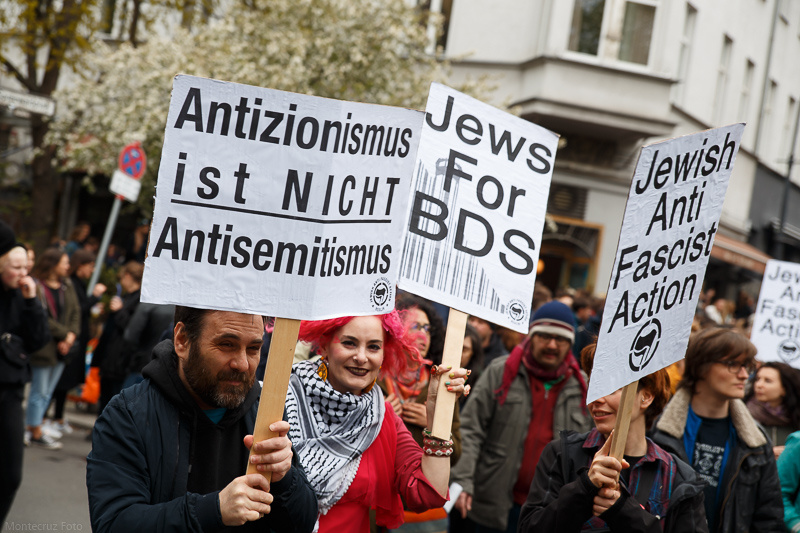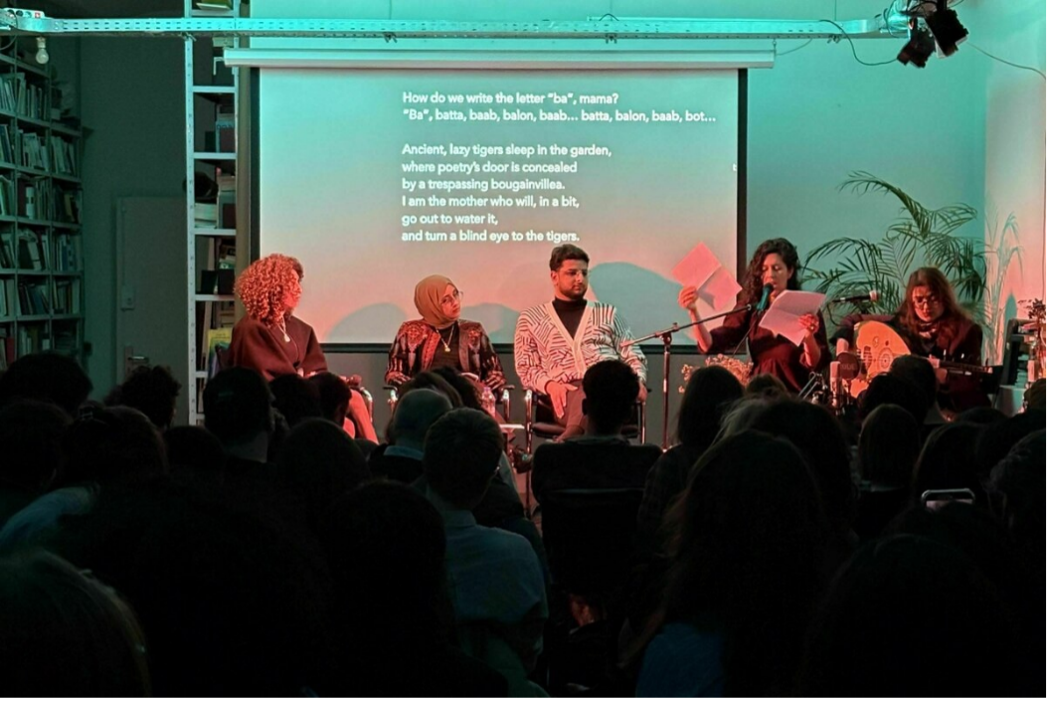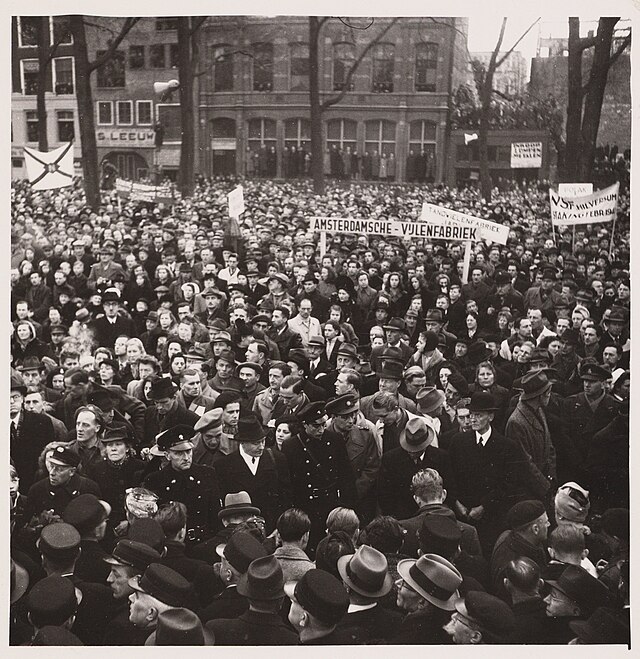If you’d like to sign the resolution, you can do so on this page.
We, the students, educators and workers of German colleges and universities, are alarmed by the resolution ‘Steadfastly Opposing Antisemitism and Israelphobia in Schools and Tertiary Education While Securing Free Space for Discourse’. Purportedly dedicated to fighting antisemitism, this resolution more so threatens the safety of students and calls for the undermining of academic liberty as well as the autonomy of higher education institutions.
We are in agreement with criticism from scientists, German antisemitism researchers, and international expert organisations and consequently oppose this resolution, together with its predictable and grave consequences for academic freedom and diversity of perspective. Furthermore, according to many legal experts, the resolution raises significant constitutional concerns.
On November 7, 2024, despite heavy criticism, the Bundestag passed a primary resolution under the title ‘Never again is now: Protect, Preserve and strengthen Jewish Life in Germany’ with majority favour in nearly all parties, including the AfD. A new resolution against antisemitism is now being proposed—one aimed at education facilities. It is projected to be put to vote at the end of January.
The resolution feeds a distorted narrative that denigrates Palestine solidarity activism and undermines the role of the university as a place of open exchange and political debate. The resolution selectively cites studies from the University of Konstanz, omitting important findings that show antisemitism is lower among students than in the general population. It calls for “exchanges between universities and security authorities […] with intensity and regularity” (III.2), the expansion of legal measures and repressive tools, the strengthening of security measures and the expulsion of students who express undesirable views. According to the resolution, supporters of “the ‘Boycott, Divestment and Sanctions’ movement (BDS for short) and similar movements […] must have no place in German educational and academic institutions” (III.10). The use of such imprecise language to define who should be excluded from German universities is alarming and extends the scope of state repression far beyond the pro-Palestinian student movement. Furthermore, the resolution isolates German universities from international partner institutions, puts them at odds with international law, undermines their credibility and risks global backlash.
The proposed resolution reinforces the very tools that have been and continue to be used to justify police violence against students and terminations of artists, lecturers, speakers, researchers and others for their political views.
In Gaza, all schools and universities have been bombed and literally destroyed by Israel since October 2023. Israel is responsible for the killing of countless students, researchers, artists, doctors and journalists in the Gaza Strip, which amounts to a scholasticide of the Palestinian education system. According to a special committee of the United Nations, Israel’s actions in Gaza amount to genocide, to which Germany is contributing with supplies of weapons, among other things. At the international level, Germany has therefore already been accused of complicity in the genocide and yet continues to defend Israel against relevant lawsuits before the International Court of Justice.
On a national level, in the name of supposedly protecting Jewish life in Germany, the state and institutions are increasingly using repressive measures and deterrence tactics against Palestine solidarity activists, including many Jewish people, undermining their freedom of opinion and political expression. The proposed resolution reinforces the very tools that have been and continue to be used to justify police violence against students and terminations of artists, lecturers, speakers, researchers and others for their political views. The Archive of Silence project documents cases of dismissals, firings, and other forms of repression of pro-Palestinian – including Jewish – voices.
The resolution undermines the meritocratic processes of funding allocation inherent in science by emphasizing that “federal funding is awarded exclusively on the basis of scientific excellence” and that “scientific excellence and anti-Semitism are mutually exclusive” (III.9). In doing so, it relies solely on the controversial definition of antisemitism used by the International Holocaust Remembrance Alliance (IHRA), which equates criticism of Israel with antisemitism. Substantive criticism of the inaccuracy and documented misuse of this definition to discriminate against people on the basis of their political opinion is ignored. As a result, the release of federal funding is made dependent on the political views of the researchers, which is intended to silence legitimate criticism of Israeli policy. Freedom of research is incompatible with state control of research funding and the monitoring of private and political statements and activities. In spring 2024, for example, a girls’ club in Berlin was terminated without notice due to the political attitudes of its staff, while at the same time the BMBF investigated whether funding could be withdrawn from researchers who had spoken out against the criminalization of pro-Palestinian students. The actions of the minister in office at the time of the BMBF “Fördergate” scandal are explicitly welcomed in the draft resolution (I.), which is alarming.
The resolution expands the one-sided teaching of antisemitism and the state of Israel in the context of education about the Middle East, while excluding Palestine and Palestinians, who are only mentioned in the context of Hamas, as legitimate topics for teaching and research. The Beutelsbach Consensus, which was developed against the indoctrination of the Third Reich, stipulates that learners should have access to different perspectives on social and political issues and thus be able to think critically and form their own opinions. The one-sidedness in research and teaching propagated in the resolution contradicts independent, critical education that is free from political indoctrination.
For these reasons, we reject the resolution and call for an approach that respects different perspectives and preserves academic freedom.
Demands
We, the undersigned, call on university administrations, faculty leaders, student representatives, student initiatives and university staff to take a principled stance against the authoritarian threat posed by the suggested resolution.
We demand that the above-named parties:
- take a clear public stance against the resolution’s undermining of academic freedom, freedom of expression and violation of university autonomy.
- reject the use of the IHRA definition as the sole, official and legal definition of antisemitism at research and educational institutions.
- reject the call for increased securitization at universities through “close exchange with security authorities” (III.12.e) and carceral logics, including by establishing an anti-racism and anti-discrimination office and independent protocols for de-escalating conflicts without police presence.
- counter anti-Palestinian bias with balanced curricula that include Palestinian history at all levels of education, Palestinian knowledge production and teaching about Palestinians beyond their role as an occupied people.
- “advocate for research and teaching in accordance with international law and for consistent action in cases of non-compliance by universities, research institutes and other academic institutions” (quote from the working principles of the Alliance for Critical and Solidarity Science).
___________________________________________________________________________________
First signatories
Groups
Not In Our Name TU Berlin
Not In Our Name ASH Berlin
Not In Our Name UdK Berlin
Linksjugend [‘solid] Hessen
Linksjugend [‘solid] Fulda
DieLinke.SDS Fulda
DieLinke.SDS Marburg
Students for Palestine FU Berlin
Students for Palestine Hannover
Students for Palestine Würzburg
Students for Palestine Bonn
Students for Palestine Freiburg
Students for Palestine Halle
Students for Palestine Hamburg
Students for Palestine Münster
Students for Palestine Fulda
Students for Palestine Leipzig
Students for Palestine Darmstadt
Bündnis Palästinasolidarität Marburg
BAK Klassenkampf in der Linksjugend [‘solid]
Uni(te) for Pali, Bremen
Queer Liberational Action
Decolonize Charité Berlin
Ingolstadt Eichstätt for Palestine
Stand UP for Palestine
Kritische SKA, Leipzig
KIARA (Kritische Islamwissenschaftler*innen und Arabist*innen), Leipzig
Individuals (alphabetical order)
Enrica Audano, Universität Leipzig
Prof. Michael Barenboim, Barenboim-Said Akademie
Niklas Barth, Linke Frankfurt am Main
Prof. Dr. Christine Binzel, FAU Erlangen-Nürnberg
Adam Broomberg, Künstler
Dr. Irene Brunotti, Universität Leipzig
Prof. Celine Condorelli
Dr. Mark Curran
Jasmin Daka
Prof. Dr. Dr. Donatella Della Porta, Scuola Normale Superiore
Anna Ehrenstein
Dr. Jannis Julien Grimm, Freie Universität Berlin
Hanna Hertel, Studentin, Mitglied GEW Berlin
Dr. Thomas Herzmark, Universität Göttingen
Dr. Angela Last
Lucilla Lepratti, Universität Leipzig
Dr. Lara Krause-Alzaidi, Universität Leipzig
Urs Kollhöfer, Mitglied im Landesvorstand der Linken Hessen
Urs Kroll, Student, Mitglied GEW Berlin
Dr. Nils Riecken, Ruhr-Universität Bochum
Matthias Riedl, Mitglied im Landesvorstand der Linken Hessen
Prof. Dr. Marc Siegel, Johannes Gutenberg-Universität Mainz
Maxi Schulz, Student*in, Mitglied GEW Berlin
Prof. Dr. Hendrik Süß, Friedrich-Schiller-Universität Jena
Margarita Tsomou, Kuratorin
Laura Oettel, Studentin, Mitglied GEW Berlin
Antonia Marquardt, Jugendpolitische Sprecherin der Linken Hessen
Prof. Dr. Agata Lisiak, Bard College Berlin
Prof. Dr. Olaf Zenker, Martin-Luther-Universität Halle-Wittenberg
Further supporters
- Prof. Dr. Schirin Amir-Moazami
- Elakoum Mounib
- Prof. Dr. Michael Zander, Hochschule Magdeburg-Stendal
- Nasrin Karimi Rechtsanwältin
- Amanda Pope
- Norbert Lang, Journalist
- John Lütten, Universität Hamburg
- Prof. Dr. Robin Celikates, Freie Universität Berlin
- Julia Vogel
- Prof. Dr. Susanne Leeb, Kunsthistorikerin, Berlin/Lüneburg
- Aino Korvensyrjä, Freie Universität Berlin
- Dr. Carmen Becker
- Prof.Dr. Sabine Broeck, Universität Bremen
- Maher Ben Abdessalem
- PD Dr. Julia Vorhölter, Max Planck Institut für ethnologische Forschung
- Phillipp Slanina, Student
- Dr. Roy Karadag, Universität Bremen
- Prof. Dr. Manfred Liebel, Berlin/Potsdam
- Carla Schumann, Studentin, Martin-Luther-Universität Halle-Wittenberg
- Annefei Borgs-Uhlendorf
- Prof. Dr. Uli Beisel, Freie Universität Berlin
- Carolin Loysa, Freie Universität Berlin
- Jamal Sreiss
- Dr. Jeanne Féaux de la Croix
- Prof. Dr. Angela Harutyunyan, UdK Berlin
- Dr. Hanna Nieber, Max-Planck-Institut für ethnologische Forschung
- Kawthar El-Qasem, Düsseldorf
- Dr. Anne Menzel, Institut für Friedensforschung und Sicherheitspolitik an der Universität Hamburg
- Yuri Kwon
- Dr. Jannik Schritt, Universität Göttingen
- Prof. Dr. Anika König, Freie Universität Berlin
- Linda Beck, Universität Göttingen
- Wolfgang Lörcher, DIE LINKE Fulda
- Leonie Benker, Freie Universität Berlin
- Dr. Mathias Delori, CNRS-Forscher, Centre Marc Bloch
- Prof. Dr. Alice von Bieberstein, Humboldt Universität zu Berlin
- Nick Bley, Senator Universität Kassel
- Thomas Götzelmann, Martin-Luther-Universität Halle-Wittenberg
- Aaron Miller, Universität Leipzig, Max Planck Institute for Human Cognitive and Brain Sciences
- Raphaël Grisey, Filmmacher
- Marina Luna, Free University Berlin
- Christin Sander, FU Berlin
- Dr. Philipp Zehmisch, Universität Heidelberg
- Dr. Nicole Wolf, Universität London und freiberufliche Dozentin Berlin
- Dr. Benjamin Schütze, Arnold Bergstraesser Institut (ABI) Freiburg
- Prof. Dr. Martin Sökefeld, LMU Müchen
- Pia Berghoff, Freie Universität Berlin
- Daniel Shuminov, Goethe Universität
- Dr. Bettina Gräf, LMU München
- Prof. Dr. Wolfgang M. Schröder, Universität Würzburg
- Mithu Sanyal, Schriftstellerin und Kulturwissenschaftlerin
- Prof.Dr. Rupa Viswanath, Universität Göttingen
- Alma Kulha
- Aseela Haque, Freie Universität Berlin
- Susanne Schultz, Goethe-Universität Frankfurt/Main
- Anil Shah, Universität Kassel
- Dr. Ximena Alba
- Marius Bickhardt (Centre Marc Bloch/Sciences Po Paris)
- Huan Chen, Universität Münster
- Prof. Dr. Dominik Mattes, Freie Universität Berlin
- Christian Strippel, Weizenbaum-Institut
- Anna Hofmann Fraktionsvorsitzende der Linken im Landkreis Marburg-Biedenkopf
- Laure Piguet, Centre Marc Bloch/Université de Fribourg
- Noémie Regnaut, Université Paris-Sorbonne Nouvelle – Centre Marc Bloch Berlin
- Anonym, Centre Marc Bloch/EHESS
- Dr. Déborah Brosteaux, Marc Bloch Zentrum (Berlin)
- Marianne Adam (Centre Marc Bloch/Université de Tours)
- Florian Muhl, Universität Hamburg
- Mareike Biesel, Universität Göttingen
- Karlotta Bahnsen, Freie Universität Berlin
- Layla Kiefel (Universität Konstanz, Centre Marc Bloch)
- Elfi Padovan Münchner Friedensbündnis
- Dr. Dörthe Engelcke, Max Planck Institute for Comparative and International Private Law
- Philipp Rauch, Student TU Darmstadt
- Rebeka Nasir, Studentin, Technische Universität Darmstadt
- Kaoutar H., Goethe Universität Frankfurt
- Leon Kianzad, Goethe-Universität Frankfurt/Main
- Christos Kourris, TU Dresden
- Claire van Loon, Studentin
- Anna Müller
- Miriam Bartelmann, Arnold-Bergstraesser-Institut (ABI) Freiburg
- Luis Kliche Navas, Freie Universität Berlin
- Dr. Barbara Orth, IRS
- Dr. Tobias Schmitt, Universität Hamburg
- Ariane Alba Marquez, Bundesvorstand DieLinke.SDS, Goethe-Universität Frankfurt/Main
- Prod. Dr. Aram Ziai, Universität Kassel
- Nicholas Sagberger – Uni Regensburg
- Dr. Alix Winter, Centre Marc Bloch
- Willi Hertelt, Kurt-Tucholsky-Oberschule Berlin
- Layla Kiefel (Universität Konstanz, Centre Marc Bloch)
- Qusay, TU Darmstadt
- Christoph Maier, Uni Leipzig
- Mira Schmitz, MLU Halle-Wittenberg
- Prof. Dr. Wolfgang Gabbert, Leibniz Universität Hannover
- Kim Lucht, FSU Jena
- Lea Berger
- Barbara Gamper, Künstlerin und Pädagogin
- Taosif Talukder, TU Darmstadt
- Dr. Christian Ambrosius, Freie Universität Berlin
- Jorinde Becker, Hochschule für Grafik und Buchkunst Leipzig
- Jared Cobain HGB Leipzig
- Anna Orinsky, European University Institute
- Prof. Dr. Johanna Schaffer, Kunsthochschule Kassel
- Andreas Weiß, Köln
- Eliane Diur, Hochschule für Grafik und Buchkunst Leipzig
- Madlen Ernst, MERA25 Berlin
- Abdullah Rahhal – Die Linke Freiburg und Masterstudent Uni Freiburg
- Rana Brentjes
- Sonja Brentjes, Bergische Universität Wuppertall
- Mareike Biesel, Universität Göttingen
- Thomas Ruffmann, Kleve, Musiker, politischer Erwachsenenbildner
- Dr. Raquel Rojas, Freie Universität Berlin
- Tabea Knerner, Albert-Ludwigs-Universität Freiburg
- Sara Türen
- Frank Madsen Journalist
- Prof Ramis Örlü, Royal Institute of Technology, Stockholm, Schweden
- Prof. Dr. Christin Bernhold, Universität Hamburg
- Jasmin Sarah Hahn, Freie Universität Berlin
- Anna-Lena Kutzki, HAW Hamburg
- Sonja Rohan, Freie Universität Berlin
- Janine Schneider
- Luise Dechow, Universität Hamburg
- Leyla Tewes
- Clemens Grünberger
- Samah Schmitt-Razzougui
- Verena Müllner
- Selim Heers, Universität Leipzig
- Hava Aras
- Ahmed Tarek Alahwal, Universität Freiburg
- Raina Ivanova
- Hiba Banat, Studentin
- Graciela Bach
- Candice Breitz
- Dagmar Kohlmeier, Masterstudentin, Universität Freiburg
- Felicia Schmidt, Berlin
- Bircan Sönmez, Mera25 NRW, Düsseldorf
- Guillaume Carpentier, Mera25
- Christian Suhr – About People Film Produktion
- Deniz Khalifé
- Adrian Khalifé
- Louay Khalifé
- Ilay Khalifé
- Isa Khalifé
- Ayesha Siddiqi-Sikora
- Nadia El-Ali, Freie Universität Berlin
- Peter Förster, AK Zivilklausel der Uni Köln, Student
- Luca Groß, SDS Frankfurt
- Franziska Hildebrandt, SDS Uni Hamburg
- Marlies Wehner, M.A., Fachstelle für interkulturelle Bildung und Beratung-FiBB e.V.
- Jasper Wittenburg
- J. Kamo Anselm, UHH
- Emily Allegra Dreyfus, Filmuniversität Babelsberg
- Dr. David Jordan, Ruhr-Universität Bochum
- Prof. Dr. Claudius Zibrowius, Ruhr-Universität Bochum
- Artur Brückmann, Universität Hamburg
- Therese Friedemann
- Alp Kayserilioğlu, Universität Tübingen
- Peter Förster, AK Zivilklausel Uni Köln
- Eliaz Zeilmeir, Goethe Universität Frankfurt
- Rand Ashqar, Freiburg Universität
- Jean-Marie Yazbeck, Master Student University of Freiburg
- Anonym, Universität Freiburg
- Selma Härnqvist
- Muayad Chalabi, Technische Universität München
- Andrea Sittoni, LMU München
- Francisco Torres, Fraunhofer ISE
- Richard Lenerz, Universität Trier
- Lenna Fischer – Uni Hannover
- Jana Müller, Studentin
- Johannes Heißler, LMU München
- Lale Khoshnoud, Hochschule Hannover
- Eudy Mahlies, Universität Leipzig, Leibniz Institute for Tropospheric Research (TROPOS)
- Ingo Jäger, Bezirksratsherr Hannover Vahrenwald-List
- Marwan Abdelaal, Technische Universität München
- Michael Kreich
- Michelle Schinkel, Universität Konstanz
- Hanna Neghabian, SfP
- Gianluca Pagliaro, Max Planck Institute for Gravitational Physics
- Miriam Bartelmann, Arnold-Bergstraesser-Institut (ABI), Freiburg
- Björn Pohl
- Leonie Hiller
- Jasper Martins, Leibniz Universität Hannover
- Amir Raza (Albert Einstein Institute Hannover)
- Franziska Bax, Rachel Carson Center LMU München
- Mariel Bernnat, Universität Freiburg
- Lucia Grimm (Albert Ludwigs Universität Freiburg)
- Prof. Dr. Tahani Nadim
- Cora Orlando, Albert-Ludwigs-Universität Freiburg
Further supporting groups
Bündnis Yousef Shaban
Estudantes por Justiça na Palestina (FCSH Nova, Portugal)
Students for Palestine Mainz
Sozialistisch-Demokratischer Studierendenverband (DieLinke.SDS)
Students for Palestine Frankfurt
Die Linke Hessen
Hochschule for Palestine Darmstadt
Studis gegen Rechts Leipzig
Fachschaftsrat Politikwissenschaft (Universität Leipzig)
Uni for Palestine Munich
Linksjugend [‘solid] Leverkusen
Decolonise HU, Berlin




